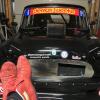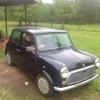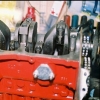
Whistling Noise From Engine Bay When Accelerating
#1

Posted 19 June 2017 - 01:19 PM
Ive finished restoring a 1979 austin mini but have swapped the original 998 for a 1275 (verto rebored to 1293) from a metro mini.
However recently after a while of driving this horrible whistling noise comes from the engine bay when im accelerating, usually 1st and 2nd gear make it considerably louder than 3rd.However as i accerlate the sound gets higher pitch and it will stop completely if i press the clutch down. The gears are a little clunky to get them in but it doesnt slip out at all. I have a new water pump so didnt think it was that but any suggestions would be a great help!
Thanks
#2

Posted 19 June 2017 - 01:37 PM
does it change in relation to engine speed or to road speed?
#3

Posted 19 June 2017 - 03:57 PM
does it change in relation to engine speed or to road speed?
Engine speed, sound vanishes if i have my foot on the clutch and coasting downhill. If i was coasting at 30mph and put it into second and lifted my foot off the clutch the whistle appears really loud until the revs go down
#4

Posted 19 June 2017 - 04:20 PM
Also check that nothing is loose around the air intake, or obstructing it. Something in the actual intake that should not be there can make a surprising amount of noise.
The actual sound of a slipping belt is rather different from that caused by airflow but that does not help you much until you have heard both.
#5

Posted 20 June 2017 - 12:59 AM
Edited by Mike L, 20 June 2017 - 01:00 AM.
#6

Posted 20 June 2017 - 04:41 AM
Try running it briefly without the fan belt to eliminate (or include !) these belt driven ancillaries.
One item it could be is the Alternator, these can make a whistling noise and usually indicates an internal fault with them
#7

Posted 20 June 2017 - 06:43 AM
#8

Posted 20 June 2017 - 08:39 AM
So that may suggest fan belt or air intake/manifold, both of which are sensitive to engine speed. It does seem to me to be most likely fan belt. Check the tension and condition, and that none of the pulleys are splitting due to an over-tight belt.
Also check that nothing is loose around the air intake, or obstructing it. Something in the actual intake that should not be there can make a surprising amount of noise.
The actual sound of a slipping belt is rather different from that caused by airflow but that does not help you much until you have heard both.
So it could be the actual belt thats making the whistle sound? When ive been driving and the whistle appeared i sprayed the belt with wd40 but the sound remained. Also what could be lose around the intake?
#9

Posted 20 June 2017 - 08:53 AM
Try running it briefly without the fan belt to eliminate (or include !) these belt driven ancillaries.
One item it could be is the Alternator, these can make a whistling noise and usually indicates an internal fault with them
The sound doesnt usually appear until ive driven it for a good 30minutes, could it be the water pump not screwed on tight enough?
How would i check the alternator to find if that is the cause of the problem?
#10

Posted 20 June 2017 - 09:02 AM
I doubt it would be the water pump, though anything's possible and best to keep an open mind!
In regards to the Alternator, I'd suggest substituting it with another would be the fastest way to narrowing to that, unless KernowCooper can suggest something else?
#11

Posted 21 June 2017 - 04:12 PM
#12

Posted 21 June 2017 - 04:27 PM
Try running it briefly without the fan belt to eliminate (or include !) these belt driven ancillaries.
One item it could be is the Alternator, these can make a whistling noise and usually indicates an internal fault with them
The sound doesnt usually appear until ive driven it for a good 30minutes, could it be the water pump not screwed on tight enough?
How would i check the alternator to find if that is the cause of the problem?
If the water pump was loose you'd see leakage!
#13

Posted 21 June 2017 - 08:36 PM
I looked into the possibility of it being the alternator however the sound has always been a significant whistling, not a rattle then turned into a whine.
That is the sound they'll make.
The fault I mentioned is an electrical fault, not mechanical.
It can be from one of several internal faults;-
Output Diode Shorted
Earth Side Diode Open Circuit
Winding shorted to Earth
And likely some others.
With some of these faults, along with the whistle, they can get hot, but not always.
1 user(s) are reading this topic
0 members, 1 guests, 0 anonymous users


















